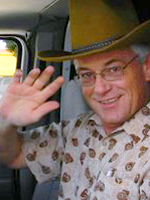Local radio doesn't quite make it to Y2K
By Leon WordenFriday, October 8, 1999
| M |
Then, in Canyon Country, a miracle.
At the 20th hour, at precisely 12:20 a.m., 1220 AM lit up on the radio dial. First, canned music, then, around 5 a.m., Barry McKeever, A.J. Morgan and Dennis Michaels grabbed a microphone.
Order restored.
By 10:30 a.m. Tuesday, Mayor George Pederson and the City Council had declared KBET Santa Clarita’s “official disaster station,” and McKeever, Morgan, Michaels and station owner Carl Goldman entered the history books as the first in a long line of “Earthquake Heroes,” as Signal cartoonist Randy Wicks dubbed the exceedingly selfless.
It would be days, weeks, before network television figured out where the hell Santa Clarita was. We already had pulled together, thanks in no small measure to our local radio station.
For months we tuned to KBET, whose tireless broadcasters filled the air with the dramatic,
Life gradually returned to normal, but life was never quite the same for Santa Clarita’s only local radio station after the need for disaster news passed.
Goldman liked the idea of
McKeever stayed on after Goldman sold the station, announcing local high school and college games and hosting
Media conglomerate Jaycor Communications changed the format to
This month they’ll be shutting the office in Canyon Country, but the real changes were made months ago. The real changes snuck up on us ever since the station’s sale to a
Santa Claritans still will be able to tune in to
Welcome to Radio 2000,
Clear Channel will dominate the airwaves in the 20 largest U.S. markets except Seattle when it completes another
Local radio was a big part of American life for most of this century, but I imagine its days were already numbered by the time we got around to experimenting with it here in Santa Clarita.
Like the rest of the nation, we were tantalized by television, now we’re intimate with the Internet, and along the way, radio, and some of the sense of community it reflected and helped to foster, slowly slipped away.
And whose fault do you suppose that is?
©1999 LEON WORDEN — ALL RIGHTS RESERVED

